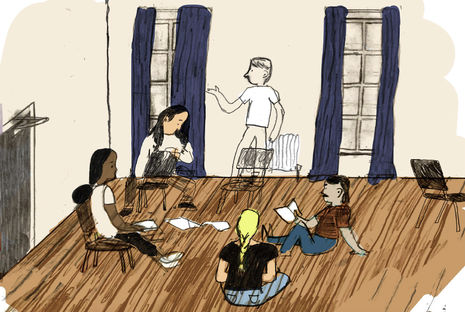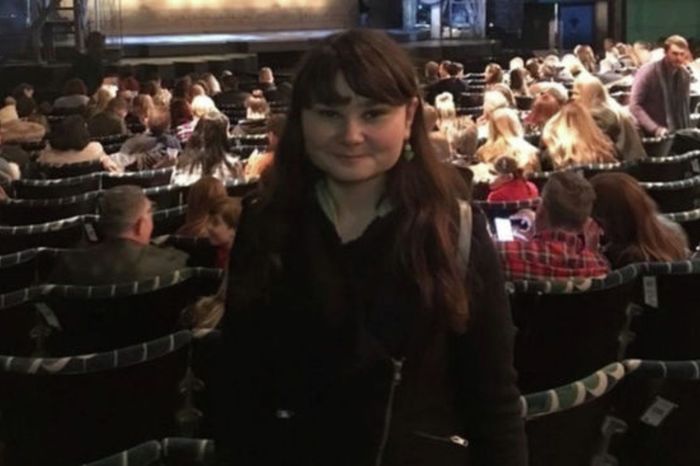The structural problem with Cambridge theatre
Milly Kotecha imagines the benefits that could come from a new system of theatre companies

“What made you choose Robinson?” is the question which I have faced countless times ever since I applied to the ‘Red Brick Palace’. Amongst some uninteresting logistical answers, “It has its own theatre society as well as an auditorium and outdoor stage” was one of my most genuine. I was so excited to be involved in theatre within my college, put on shows, have acting sessions, and be a part of the committee. Perhaps that was why receiving a singular email after joining the Brickhouse Theatre Company mailing list in Freshers Week came as such a let-down.
This is by no means an attack on Brickhouse, which has produced some stellar shows this past year, nor is it an attack on any college-led theatre company for that matter. The revival of Trinity’s Dryden Society, along with the well-established BATS and Pembroke Players, proves the success of collegiate theatre. However, I believe there is an innate problem with the structuring of the Cambridge theatre scene, and how college theatre companies play a role within it.
“How great would it be to be able to experience a sense of belonging with your fellow company members?”
I am very lucky to have come from Leicester, a city with an innovative and national award-winning theatre. I have had the wonderful opportunity to be a part of the Curve young acting and musical theatre companies, which entailed weekly sessions with our directors, choreographers, musical directors, as well as working towards a show each year for each company. Having the experience of such stable theatre exposure, where casting for shows is conducted from within the group, it is clear to me what the Cambridge theatre scene is truly missing.
Now, I am not claiming to be the voice of every thespian fresher trying to make their Camdram debut. However, I can say for certain that I would not have spent my first term lamenting the lack of theatre in my university life if there was a similar sense of stability in the organisation of Cambridge theatre. Imagine this: college theatre companies build up an identity for themselves, and a group of members — not a committee — who have sessions weekly like every other society in Cambridge, and work together towards a couple of shows a year. This doesn’t detract from the big CUADC/CUMTS funded shows, which can still be open to anybody, and this doesn’t mean that societies such as BATS can’t put on shows open to people outside of the company. In fact, it doesn’t even need to be college affiliated companies, but entirely separate student acting societies — it just means that there is a greater sense of belonging, purpose, and stability.
If you really think about it, the current meaning of ‘Pembroke Players present…’ or ‘Fletcher Players present…’ equates to funding, performance venue, and a member of the committee being on the prod team as a show contact. It leaves this uncomfortable liminality where, for example, if Dryden put out an open casting call for a show and half the cast were Trinity students, it would come across as slightly biased. But if no Trinity student was cast, could it really be ‘Dryden presents’?
“If people could be a part of a smaller group, they would have the chance to perform without this fear”
In Cambridge, every show tends to be its own bubble. Yes, if you do enough theatre you do encounter the same people over and over, and naturally there is a group of theatre lovers who band together. However, it’s strange to me that the culture is to move from one show and one cast to the next, and unless you become particularly close (shoutout to my Oedipus cast) you won’t encounter that same mix of people in one room apart from that one time you have reunion drinks. How great would it be to be able to experience a sense of belonging with your fellow company members, who can be a theatre anchor that’s parallel to the other friendships formed as strongly as they can be in the three-week rush of a single show.
I think this would also encourage more people to take the Camdram plunge. Many of my friends have expressed an interest in theatre but are daunted by the audition process, and the name of ‘ADC Theatre’ associated with productions. If people could be a part of a smaller group, they would have the chance to perform without this fear. Whether it springboards them to auditioning for bigger shows, or these are the theatre heights they reach, at least they can have the opportunity to do what they love in a more relaxed manner.
This ‘reformed’ system would serve to bring opportunities to as many new people as possible, freshers and masters students alike — one of the core values of the theatre scene. However, for now I wouldn’t blame us if we, the hardened second and third years who have had to work up the Camdram ladder, don’t want an entire system overhaul as the incoming freshers face their first set of Michaelmas auditions in a couple of months’ time.
 News / Judge Business School advisor resigns over Epstein and Andrew links18 February 2026
News / Judge Business School advisor resigns over Epstein and Andrew links18 February 2026 News / Hundreds of Cambridge academics demand vote on fate of vet course20 February 2026
News / Hundreds of Cambridge academics demand vote on fate of vet course20 February 2026 News / Petition demands University reverse decision on vegan menu20 February 2026
News / Petition demands University reverse decision on vegan menu20 February 2026 News / CUCA members attend Reform rally in London20 February 2026
News / CUCA members attend Reform rally in London20 February 2026 News / Gov grants £36m to Cambridge supercomputer17 February 2026
News / Gov grants £36m to Cambridge supercomputer17 February 2026










